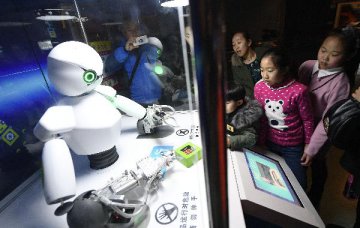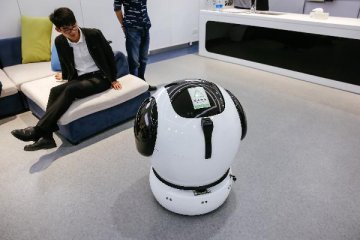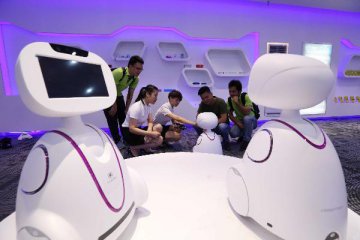
All investments, all predictions, all ironclad future megatrends point in one direction: Artificial Intelligence (AI), experts have predicted.
The AI market segment will jump from 126 billion U.S. dollars in 2015 to 3.1 trillion by 2024, according to a Transparency Market Research prediction in September.
Thanks to AI, billionaire investor Mark Cuban says, "the upcoming decade will see the greatest technological revolution in history," and a Nov. 19 Los Angeles Times article headlined, "Chipmakers bet on the 'big bang' of artificial intelligence."
Nvidia Corporation is the world leader in AI - its NASDAQ stock more than doubling since May - to 200 U.S. dollars a share on Oct. 30 - and hitting 213 U.S. dollars a share Monday - with no end in sight.
"Nvidia's invention of the GPU (Graphics Processing Unit) in 1999 sparked the growth of the PC gaming market, redefined modern computer graphics, and revolutionized parallel computing," Nvidia spokesperson Kristin Bryson told Xinhua.
Bryson credits the GPU as "acting as the brain of computers, robots, and self-driving cars that can perceive and understand the world," and ushering in "the next era of computing" by igniting modern AI."
Nvidia is a 7 billion dollars U.S. company headquartered in Santa Clara, California, and was founded in 1993 by Taiwanese businessman Jensen Huang.
LENOVO
Beijing-based Lenovo is also spearheading AI research and commercial applications, and highlighted these efforts at SC17 in Denver last week.
No surprise to industry experts, Lenovo confirmed to Xinhua it is ramping up its AI efforts by partnering with North Carolina State University and University College of London to further its research efforts.
"Lenovo has more than 100 data scientists and AI developers across the world," Madhu Matta, Lenovo's VP and General Manager, said in a statement.
Lenovo has launched three new global AI innovation centers and two new AI infrastructure offerings-new GPUs for ThinkSystem SD530 and the Lenovo Intelligent Computing Orchestrator (LiCO)-that are specifically engineered for AI workload deployment and management, according to Matta.
In 2013 Lenovo became the world's largest personal computer vendor by unit sales, pulling past HP, Dell, Apple and Acer, according to Gartner.
Lenovo entered the smartphone market in 2012, acquired Motorola Google in 2014, and became China's top smartphone vendor that year.
With 2016 revenues of 43 billion U,S. dollars, Lenovo is positioned to propel AI research and development headfirst into untold future earnings and applications.
At SC17 in Denver last week, Lenovo released a recent Linksys survey that said 76 percent of global IT leaders said AI was fundamental to the success of their operation's strategy.
An overwhelming 96 percent of Chinese IT leaders said AI was in their future, the survey said.
INSPUR
One of those Chinese IT experts is Jun Liu, General Manager of AI and HPC for Inspur, based in Shandong, China, that develop AI software and manufacture server hardware.
In 2006, Inspur has 2,500 employees - a number that has grown to 26,000 today, according to Liu.
By 2011, Inspur's revenues reached 37 billion Yuan, and the company's sales and reach has been on the fast track ever since.
Last year, the 62-year-old IT company provided most of the AI infrastructure for Baidu, and global retailer giants Alibaba, Tencent, and JD.com.
In an exclusive interview with Xinhua, Liu explained his company's focus on AI and the emerging applications.
Liu credits his company's great success and growth to a focus on technology innovation and a grasp of useful business tools that consumers have gobbled up.
"The AI business grows automatically, Liu noted, citing "hot areas" as "autonomous driving, voice recognition, video analysis, voice analysis recognition/response, finance, and health and medicine.
The keys to pushing this technology have been "algorithms, deep learning and computing software," Liu said, noting his company is focused on providing computer capabilities.
Meanwhile, industry naysayers still question China's ability to produce chips worthy of the new revolution, as stated Monday in a Wired article by Paul Triolo, who tracks Chinese technology and related policy at the Eurasia Group.
"They may have aspirations, but when it comes to designing chips and building fabs to make them at scale the Chinese are still multiple generations behind," Triolo said.
That comment was refuted soundly by Dr. Les Cottrell, a top computer science/physicist at the esteemed Stanford University National Acceleration laboratory (SLAC).
"Chinese chip making efforts are seen in the world's fastest computer - built with all Chinese products," Cottrell told Xinhua, who said Chinese chip manufacturers "are now competing with Cisco, Intel and IBM on a 1-to-1 basis."
THE FUTURE
Meanwhile, companies like Nvidia are looking forward and aggressively producing a wide array of AI end user products.
At SC17 in Denver last week, one of the most highly attended seminars unveiled NVidia's "Jetson embedded computing platform," its new "TensoRT 3 inferencing software," and the "Redtail AI framework for autonomous mobile robotics."
Nvidia's Mynt Sdeno Robot is more than just a machine that can find its way around, a Nvidia web article says. "It recognizes your voice, knows your moods, and follows discreetly behind ready for any command."
"The curvy, diminutive robot relies on the Jetson TX1 embedded processor - which boasts 256 GPU cores - and offers processing power equivalent to 32,000 PCs running 1997-era Pentium Pros," according to Nvidia.
Nvidia is also introducing AI technology to detect lung cancer from CT Scans: Detecting, diagnosing and treating cancer requires having access to the right tools, Nvidia says, showcasing software that will perform this function.
And, in preparation for America's second biggest holiday this week, Thanksgiving, the company offered a high-tech solution to inquiring Thanksgiving dinner cooks.
"Just upload a photo of whatever tickles your taste buds, and MIT's Pic2Recipe tells you what's in it and how to make it," the company offered on its website.
"And even if you botch the dish, the fact that it was chosen by AI will give your guests something to talk about instead of politics," the post concluded.






















Latest comments